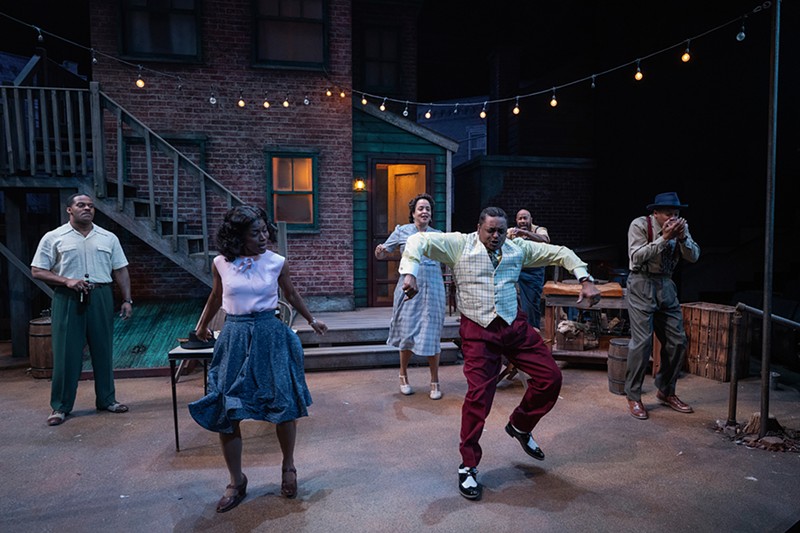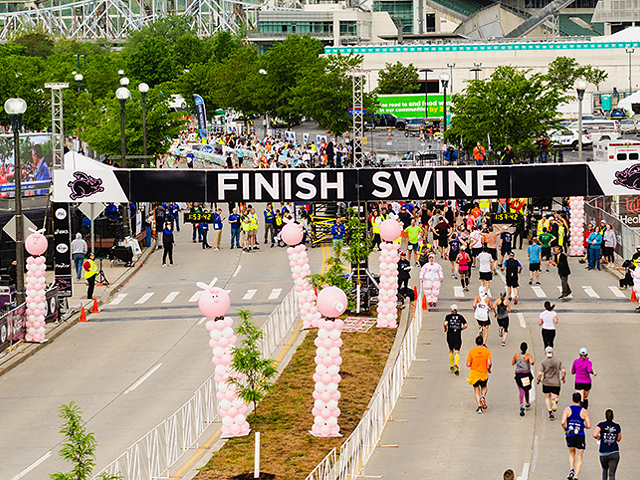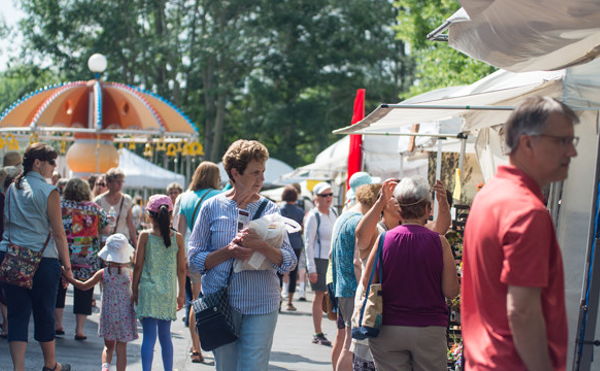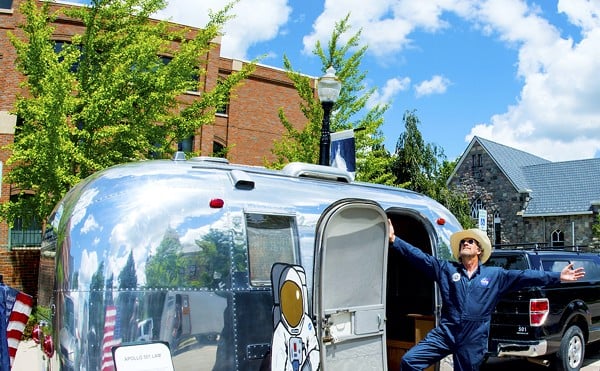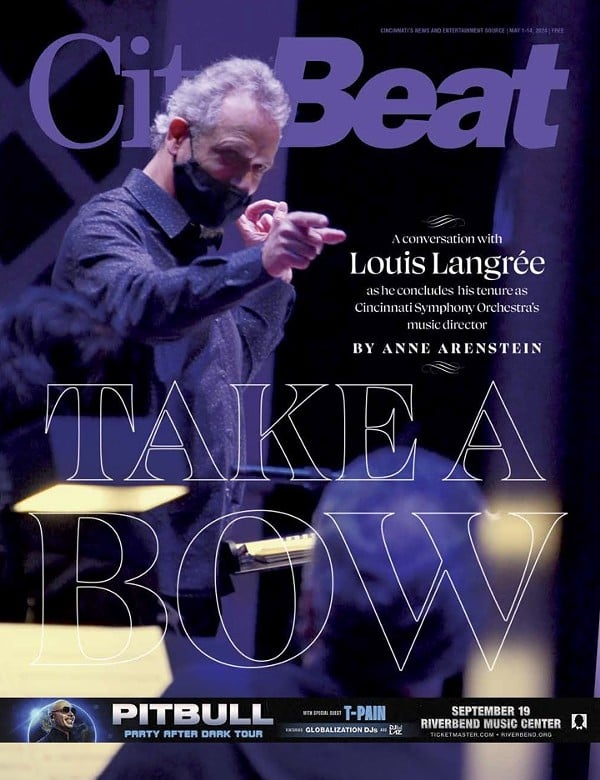This story is featured in CityBeat's May 3 print edition.
Cincinnati Playhouse in the Park continues its 2022-2023 season with August Wilson’s richly textured Seven Guitars on its brand new mainstage, The Rouse Theatre.
It’s 1948 in Pittsburgh’s Hill District, the setting for most of Wilson’s American Century Cycle, his series of 10 plays portraying African American lives across the decades of the 20th Century. There’s a great deal of sorrow in this tale set in a hardscrabble backyard during the aftermath of a funeral, but the vitality of life is the fuel that fires Wilson’s portraits of seven characters, the “guitars” on which his lyrical monologues are performed.
Staged by veteran director Ron “OJ” Parson (who has put together more than 30 productions of Wilson’s deeply admired plays), Seven Guitars is both an ode to and a celebration of Black lives.
The mourners recall musician and singer Floyd “Schoolboy” Barton (Dimonte Henning), a recent Army veteran who seemed on the cusp of a successful career with the release of a single blues recording by a Chicago record label. Like his musician friends, elegant harmonica-playing Canewell (Vincent Jordan) and energetic, talkative drummer Red Carter (Bryant Bentley), Barton faced daily uphill battles against racial prejudice in post-war America.
Barton has returned to Pittsburgh to celebrate his success and win back the affections of Vera Dotson (Kierra Bunch), who he left behind when he headed to Chicago with another woman. Vera has steeled herself against his charms, but Barton’s charms are hard to resist, despite the warnings of plain-spoken Louise (Marsha Estell) who frequently cuts through the bluster and bullshit of the men.
And then there’s eccentric Hedley (Kevin Brown). Older than the other characters, denying the early signs of tuberculosis and inclined to barely coherent outbursts that have become frequent and tolerated, he makes his way selling sundries — cigarettes, candy, hard boiled eggs and chicken sandwiches — door-to-door. He also raises and slaughters chickens. He’s unstable, often raving about his past — especially his father who promised him money and Buddy Bolton, a cornet player who was an early jazz musician and died in a mental institution.
In Hedley’s often hallucinatory monologues, Bolton comes to deliver funds from his father that could purchase land for a small plantation, a means to freedom from white dominance.
The show’s seventh character is Ruby (Saran Bakari), Louise’s attractive young niece who arrives from Alabama to escape from a life laced with love affairs and murder. She is a sexual distraction for all the men, even — or particularly — Hedley, who, despite his age and mental infirmity, yearns for a son who might rise up to become a leader and inspiration to Black men.
Wilson’s script mixes all these ingredients in a joyous stew of vibrant language and personalities — people who are inclined to burst into unfettered song and dance. These are escape mechanisms in the face of police brutality and shady business operators. Barton’s manager previously stranded the musicians in Chicago, and we later learn he’s been selling fraudulent insurance coverage. Nevertheless, Henning’s portrait of “Schoolboy” is laced with ebullient optimism, tempered by an undercurrent of resentment at how his life has unfolded — his guitar in hock, money owed not forthcoming, and missteps in his relationship with Vera, weary of his philandering ways.
Brown’s magnetic and strong-voiced Hedley is humored by the others, but his erratic and sometimes prophetic outbursts remind them of the plights and dangers they all face. He slaughters and plucks poultry — including a crowing rooster that is surely out of place in an urban neighborhood — clearly represents the challenges faced by the characters. Several chickens come to bloody ends, and death seems an inevitable outcome for the residents.
Shaun J. Motley’s understated scenic design, the backside of a two-story tenement with external steps, see-through windows and double cellar doors (Hedley stores his sale inventory there in the basement), is all that’s needed to set the story of the characters’ interactions — often in one-on-one conversations and debates.
Hedley’s makeshift butchering table where he plucks chickens is the only sign of disarray with feathers strewn across the yard. Otherwise, folding chairs and a card table are brought out periodically, and a tiny, struggling garden bed plays an integral part in the unfolding of the show’s shocking final moments.
Jason Fassl’s striking lighting design sets the tone for each scene, sometimes an amber wash as recollections unfold, sometimes bright and harsh when everyday realities come to the fore. Multiple scenes conclude with a character expressing heightened emotions in a pool of light that’s suddenly extinguished.
Along the way to its tragic conclusion, Seven Guitars taps into the vibrance of daily life in this spirited neighborhood. The constant banter between the men is full of humor, joshing and occasional threats with guns and knives often at the ready. Louise’s wry remarks usually defuse encounters and put her friends in their places. Ruby is fully aware of her sex appeal as she sashays up and down the outside stairwell in provocative red dresses. Red, dressed in the snazziest, colorful garb of the 1940s, is repeatedly a bolt of physical energy, recruiting the others into the abandon of suggestive dance. Canewell is more restrained and genuine, dressed accordingly and often a voice of reason who’s seldom taken as seriously as he would like. The costumes are designed by Yvonne L. Miranda.
All of Wilson’s plays are shot through with themes of prejudice and discontent. In many ways, Seven Guitars, set squarely in the middle of the century, represents the sharpest, most heart-rending depictions of the desperate plights of its characters. This is an important American play, and the Playhouse is to be congratulated for its dynamic and emotionally grabbing production.
Cincinnati Playhouse in the Park presents Seven Guitars through May 14 at Moe and Jack’s Place — The Rouse Theatre, 962 Mt. Adams Circle, Eden Park. Info: cincyplay.com.
Coming soon: CityBeat Daily newsletter. We’ll send you a handful of interesting Cincinnati stories every morning. Subscribe now to not miss a thing.
Follow us: Google News | NewsBreak | Reddit | Instagram | Facebook | Twitter

